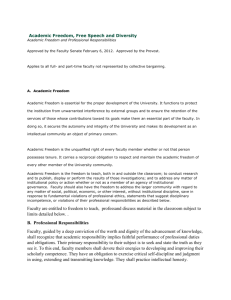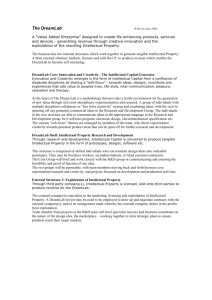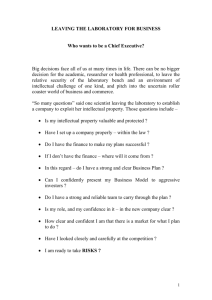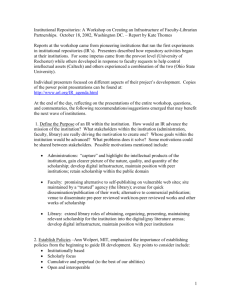Copyright and Intellectual Property
advertisement
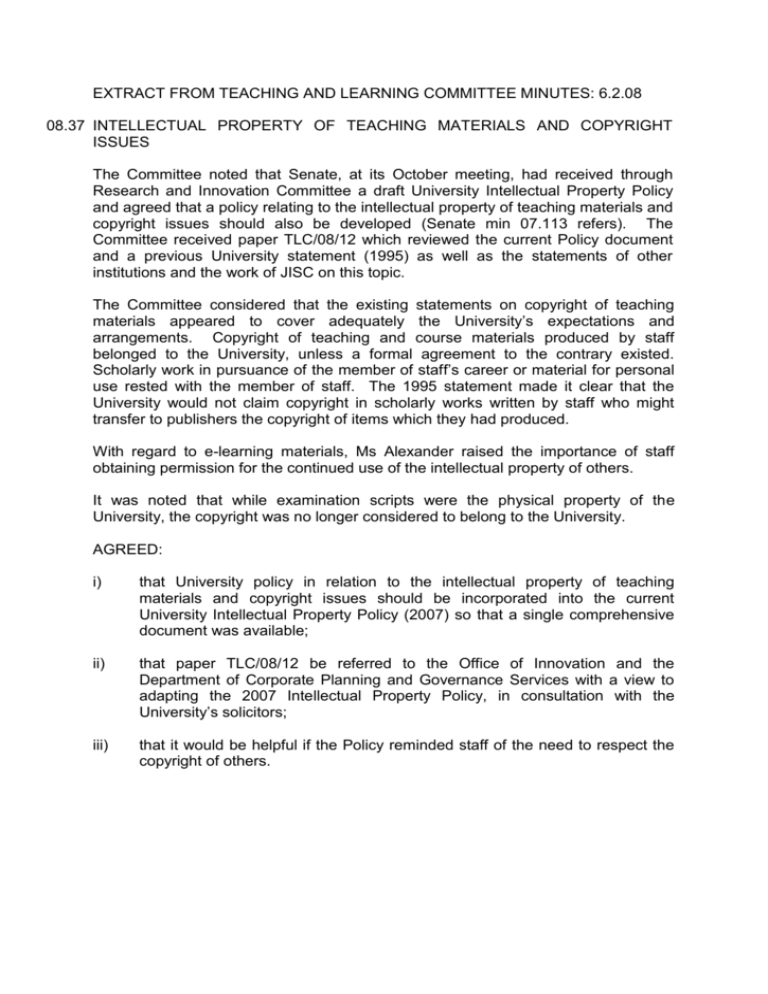
EXTRACT FROM TEACHING AND LEARNING COMMITTEE MINUTES: 6.2.08 08.37 INTELLECTUAL PROPERTY OF TEACHING MATERIALS AND COPYRIGHT ISSUES The Committee noted that Senate, at its October meeting, had received through Research and Innovation Committee a draft University Intellectual Property Policy and agreed that a policy relating to the intellectual property of teaching materials and copyright issues should also be developed (Senate min 07.113 refers). The Committee received paper TLC/08/12 which reviewed the current Policy document and a previous University statement (1995) as well as the statements of other institutions and the work of JISC on this topic. The Committee considered that the existing statements on copyright of teaching materials appeared to cover adequately the University’s expectations and arrangements. Copyright of teaching and course materials produced by staff belonged to the University, unless a formal agreement to the contrary existed. Scholarly work in pursuance of the member of staff’s career or material for personal use rested with the member of staff. The 1995 statement made it clear that the University would not claim copyright in scholarly works written by staff who might transfer to publishers the copyright of items which they had produced. With regard to e-learning materials, Ms Alexander raised the importance of staff obtaining permission for the continued use of the intellectual property of others. It was noted that while examination scripts were the physical property of the University, the copyright was no longer considered to belong to the University. AGREED: i) that University policy in relation to the intellectual property of teaching materials and copyright issues should be incorporated into the current University Intellectual Property Policy (2007) so that a single comprehensive document was available; ii) that paper TLC/08/12 be referred to the Office of Innovation and the Department of Corporate Planning and Governance Services with a view to adapting the 2007 Intellectual Property Policy, in consultation with the University’s solicitors; iii) that it would be helpful if the Policy reminded staff of the need to respect the copyright of others. UNIVERSITY OF ULSTER Paper No TLC/08/12 TEACHING AND LEARNING COMMITTEE 6 February 2008 Agenda Item 14 INTELLECTUAL PROPERTY OF TEACHING MATERIALS AND COPYRIGHT ISSUES 1 Background Senate, at its meeting of 3 October 2007, received through Research and Innovation Committee a draft revised Intellectual Property (IP) Policy and agreed that the University should develop a policy in relation to the intellectual property of teaching materials and copyright issues (Senate min 07.113 refers). This paper considers the current policy document and a previous University statement as well as the statements of other institutions and the work of JISC on this topic. 2 IP Policy Statement The draft Policy document is attached at Appendix 1. It notes that copyright is one of the four main categories of rights which protect intellectual property. While focussing on potential commercial exploitation from research, the University policy does in fact address teaching materials (Section A1, bullet 1 explicitly includes “educational materials” in its reference to “new inventions and knowledge”; and A4 recognises that IP may ensue from research, academic enterprise or educational activities). Sections A1 and A6 of the policy document state that ownership of all IP created in the course of the employee’s normal or specifically assigned duties belongs to the employer. This is the summary position. It is subject to exceptions, and at A7, ‘Duties of the employee in respect of Intellectual Property’, there is a section in bold headed ‘Exceptions’ which states in the second paragraph: “Where an employee or student produces material for the primary purpose of teaching, to be delivered directly or via CampusOne or other mode, this policy and procedures do not apply unless the creator chooses to create an exploitation vehicle via the Office of Innovation. Considerations around ownership and exploitation rights for all teaching materials reside nonetheless with the University.” The wording here seems confusing. Surely, the policy does apply, ie ownership rests with the University in accordance with A1 and A6, but the statement may imply that either exploitation rights (copyright) are assigned to the author of the material (the creator), unless the author seeks to commercialise the work through the Office of Innovation, or the University does not intend to assert its rights. The first paragraph under ‘Exceptions’ is clear that the University has no involvement when copyright is assigned to a publisher, ie when a member of staff writes a book or article, as it states that any financial settlement is between the employee and the publisher. 3 Course Documents The copyright statement in course documents states that this belongs to the University except in those for partner institutions where it belongs either to the 1 University or the institution or both depending on which has developed the curriculum. 4 Previous Discussion in the University The question of copyright of teaching materials was referred by the then Research Policy and Practice Committee (RPPC) to the former Academic Policy Committee in May 1995, following consideration of a paper prepared by the University’s Corporate Services Department on ‘Copyright - Literary, Dramatic, Musical or Artistic Works’ (paper attached – Appendix 2). The paper is quite succinct and the relevant paragraphs are 1, 2, 3, 5, 7 and 8. It is clearly stated that copyright of teaching packages and course materials belongs to the University, but that in scholarly works (books, articles) it belongs to the author (who may transfer it to publishers). It is also clear at 8 that the copyright in any material produced by staff for their personal use and reference, including aids to teaching, belongs to them. Note: The University no longer regards the copyright in examination scripts (final paragraph) as belonging to the University. The recent amendment to regulations clarified that students own the IP of their work, but that the submitted copy becomes the property of the University (TLC min 07.86). The Academic Policy Committee was generally content with the guidance. It was noted that the policy which had been adopted was that, unless a formal agreement existed to the contrary, copyright of material produced by staff in the course of their duties rested with the University and that scholarly work in pursuance of their career or material for personal use rested with the member of staff. (The Committee also noted that RPPC had agreed that it was not appropriate for the Head of the Research Office to provide advice in all cases (para 3) and that this was a function which would better be undertaken by Corporate Services, seeking advice as necessary from other departments including the Research Office.) 5 Other Institutions and JISC Examples of other institutions’ policies are provided at Appendix 3: Manchester Metropolitan University (very close to Ulster’s 1995 statement – derives from standard CVCP guidance?) Imperial College, London University College, London Loughborough University JISC has shown considerable interest in this area over the years and has commissioned various reports. A report produced by a group of University of Loughborough staff ‘Copyright Ownership of Teaching Materials’, December 2006 (attached at Appendix 4), notes the actual (default) legal position that “inherently the [University] owns the copyright of teaching materials because [they are] created during the course of employment. This is, of course, unless the institution has an alternative policy stating that teaching materials are jointly owned by the academics and the institution or solely by the academics” (2.1). However, responses to a survey undertaken by the team in 2005 (430 respondents: 88 institutions) to gauge perceptions indicated that only 26% believed that the institution owned copyright, while 13% believed it rested with the academic and 55% were unsure (2.2). 2 The report concludes that “in the past the majority of institutions have not exploited [their copyright], and indeed, have not needed a reason to exploit such rights. This explains the vague arrangements of institutional policies […], which in turn partly explains the misperceptions among academics.” (4) JISC has funded a ‘Trust in Digital Repositories’ project to examine the potential issues in setting up digital rights management (DRM) systems in “repositories of learning objects”. The project has reviewed current IPR policies and procedures and notes that “IP Policies should build on, reinforce or interpret the law, starting from the premise that material created under employment is owned by the employer. However, some polices often create greater complexity for staff by differentiating types of material and requiring different conditions or case-by-case negotiation over ownership. Variations include: Institutional ownership may be waived unless material has ‘commercial potential’. How this is judged is often complicated or unclear. Institutional ownership is retained but authors are granted a non-exclusive right to use their material in other situations. Institutional ownership is retained and originators must enter into negotiations to use material in other situations. Copyright ownership is waived by the institution in return for a non-exclusive licence allowing use by the institution. Academic staff owns copyright in course materials, but (confusingly) the institution owns copyright in multimedia works. Automatic licences are granted for use to the other party. No official policy – reference to legislation in governing ownership.” (http://trustdr.ulster.ac.uk/work_in_progress/workpackages/SP/testingTheWatersWp SP3.php) 6 Conclusion Ownership of teaching materials has not really been an issue at the University of Ulster in recent years – presumably because a policy statement already exists and because such materials have generally had no or little commercial value. If someone developed a text book, which generated substantial revenue, the University might be interested. However, the 1995 statement is clear that (at that time) the University would not claim (or assert its right to) copyright in this circumstance. a) It would be helpful to revise the IP Policy 2007 explicitly to address teaching materials (and aids to teaching) either (subject to the Committee’s view) to confirm the University’s 1995 statement or to modify it (for example as for Imperial – see Appendix 3); and to resolve the ambiguities in the exception statement of the general policy for teaching materials at A7. It may also be sensible to incorporate all of the 1995 statement (as updated). This is preferable to creating a separate policy document for teaching materials as Research and Innovation Committee, min 07.69, proposes. 3 Pending this, it is proposed that (subject to modification determined by the Committee) the policy on copyright of teaching materials and aids contained in the general statement on Copyright 1995 be reaffirmed, subject to the latter’s updating in respect of contacting the Head of the Research Office and regarding copyright in examination scripts (see 4 above). b) It may also be helpful to include a statement about ‘scholarly work’ (books, journal articles etc, which are not from contract research) and to confirm whether, as in University Policy (7) (1995), the copyright is formally assigned to the member of staff who may then assign it to a publisher. It may be preferred to include a caveat giving the University a right to claim an interest in the event of significant commercial gain – it may be that that is what the second sentence in the second paragraph of Exceptions in the IP Policy 2007 is hinting at. Scholarly work is of course distinct from teaching materials and surely falls within the remit of Research and Innovation Committee because of its general responsibility for IP policy. The inclusion of these topics would make the ‘IP Policy and Procedures’ document a comprehensive one. It would also be helpful to indicate which department advises on the protection and commercialisation of IP that derives from “educational activities” (ie not from research or academic enterprise) (see A4 and 5 of Policy). If not the Office of Innovation (which is possible at A7), then who? It is therefore proposed that this matter be referred to those with expertise and knowledge of IP and copyright law - the Office of Innovation, Governance Services, and the University solicitors - to adapt the IP Policy (2007) as necessary. 4 January 2008 AGF/lh 4



